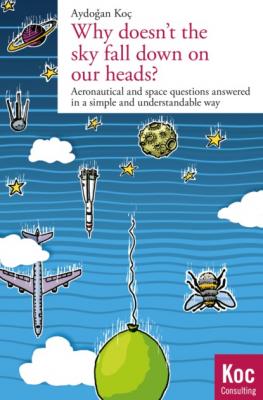Why doesn't the sky fall down on our heads?. Aydogan Koc
Читать онлайн.| Название | Why doesn't the sky fall down on our heads? |
|---|---|
| Автор произведения | Aydogan Koc |
| Жанр | Математика |
| Серия | |
| Издательство | Математика |
| Год выпуска | 0 |
| isbn | 9783748557166 |
Aydogan Koc
Why doesn’t the sky fall down on our heads?
Aeronautical and space questions answered in a simple and understandable way
Dieses ebook wurde erstellt bei
Inhaltsverzeichnis
Introduction – Why doesn’t the sky fall down on our heads?
2. A Short History of Space Travel
7. Types of engines required for flying
8. Other types of flight vehicles
Closure: Why does the apple fall on our head?
Preface
Imprint
1. Edition, July 2019
Copyright © by Koc Consulting, Potsdam
www.koc-consulting.de
All rights reserved
Proofreading: Eugen Reichl
lllustrations: Stefan Schiessl
Layout: Exploredesign, Dachau
ISBN: 978-3-00-063289-1
Information about the author:
Aydogan Koc (1957) studied Aeronautical Engineering at the universities of Stuttgart and Darmstadt. He began his professional career as a Development Engineer for military aircraft in the advanced design office of Airbus Holding (formerly MBB/DASA/EADS). He then served as a senior manager in the space division. He also worked as the production manager with the “Eurofighter” consortium. Koc played an important role in development of the European aircraft program.
He realized important business developments, cooperation and international projects as a successful manager and entrepreneur in the aerospace industry during his professional career of over 19 years at Airbus and Eurofighter.
“Koc Consulting” was established by Aydoğan Koc in Munich in 2004 and in Ankara in 2006 to meet the demand for quality consulting in the world aerospace market. The company is an assertive company which realizes international defense, space and aircraft technology projects. It is one of the aims of Aydoğan Koc to draw upon many years of European engineering experience.
Aydogan Koc established an Sport and Trainer Aircraft Company at the Ankara Etimesgut Airport in December 2011 with the company name “THK Aircraft Company Inc.“ in partnership with the Turkish Aeronautical Association (THK, founded in 1925). He is also the General Manager and Deputy Chairman of the Advisory Board of the THK Aircraft Company.
He has a private pilot license and spends his leisure time with private flights.
Acknowledgement:
To my son Yiğit for his curiosity and interesting questions and everybody who showed support, interest and thus, contributed to the creation of this book on Aviation and Space.
I would also like to thank:
Mr. Nahit Ertongur for his generous technical consultancy
and support,
Mr. Eugen Reichl who published many popular articles on space,
and the Koc Consulting team.
This book is dedicated to our little friends, the
bumblebees which are masters of aerodynamics…
Today, considering the knowledge acquired by
mankind in Aerodynamics and Fluid Mechanics,
it stands as a fact that bumblebees cannot fly.
Luckily, they have not been told so until now!
These small and fat creatures continue to fly as
always without caring about the negative views.
My son used to ask me how aircraft fly and how giant rockets manage to get into space. While I was trying to give simple answers to these complicated questions, I realized we, as Aviation and Space engineers, never thought of simply explaining what is going on with aviation in a way to be understood by everyone. This reminded me of the fact that a too detailed knowledge about something can be a disadvantage at times: while trying to explain complicated things, one slowly gets caught up in details and starts to use many technical terms without realizing it and quickly loses the interest of their audience.
I started to give brief explanations, limit my answers to the essence and decorate it with anecdotes and examples to prevent my son from losing his focus. I continued to improve this method with time. You will find many questions that my son asked me and the summary of my answers in this book. This allows everybody to gain knowledge about aviation and space technology and related rules of physics without the need for special technical background.
Nothing can ever be too perfect to be improved. Please write to me if you have any suggestions to simplify the answers,
